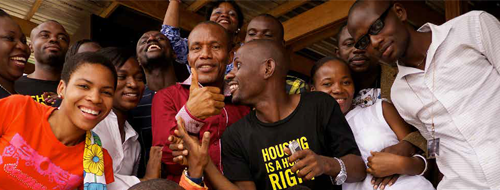- home
- About Us
- How We Work
- Projects
- Knowledge Centre
- Newsroom
- Resources
Innovation Programme
- Home
- How We Work
- Our Operations
- Country/City Window
- Innovation Programme
- Tweet

Innovation for Transformation
The Cities Alliance Innovation Programme aims to incubate fresh thinking and approaches to urban challenges, particularly in rapidly urbanising cities. Through the programme, Cities Alliance provides seed funding for projects as well as access to networking and learning that helps grantees transform their cities and communities. It is a flexible instrument designed for new and non-traditional partners, especially in those cities and communities that are typically left behind. With its thematic approach, the programme is also designed to promote comparisons between different approaches to solving a specific problem or challenge. It enables Cities Alliance to analyse the different project experiences, identify best practices and lessons learned, and disseminate them at the global level. The Innovation Programme is an evolution of the Cities Alliance's Catalytic Fund, marking its transition into a truly innovative, flexible funding window.
Innovation Projects Since its launch in 2012, the Innovation Programme has funded 31 innovative projects in 48 cities in 32 countries, disbursing USD 6.1 million in grant funding. It has issued three thematic calls for proposals: Migration, Know Your City, and Youth and the City, with one open call. These projects have catalysed urban transformation processes, created partnerships among urban development actors, and leveraged funding. Some are being scaled up within a country or integrated into national policies.
Approach to Innovation Within the programme, innovation refers to the development of concepts, products and processes that are either new in absolute terms or a novelty in their application and adaptation to a different context. Innovation is not an end in itself, but is part of longer term change. In other words, innovation has to be able to create societal value and should trigger longer term impacts in order to generate a catalytic effect. The ultimate goal is for an innovation to be institutionalised, scaled and replicated. Who Received Funding
Results
Safetipin
Safetipin is a mobile phone app that uses crowdsourcing to predict safety for women in cities. Cities Alliance supports the extension of SafetiPin to collect data at a scale where it is meaningful at a city level and build Safer Communities in New Delhi, Nairobi and Bogotá. SafetiPin is partnering with various local government institutions in the respective cities and reaching out to private businesses. So far, the project has collected and mapped its first data on the three cities.
The Collaborative Media Advocacy Platform (CMAP)
CMAP shares skills and technologies that allow people in marginalised urban communities to organise more effectively, plan more appropriately and reach the city with their voice and vision.
The CATF has supported the youth-led participatory mapping component of CMAP’s Human City project – a community-driven media, architecture, urban planning and human rights initiative in Port Harcourt, Nigeria. Through mapping, a network of young people from the city’s marginalised communities gather and share information about their neighbourhoods, collaborate with urban planners and literally put themselves on the map.
Youth Employment Centres in Mauritania
The French NGO GRET received CATF funding to set up two youth employment centres in Nouakchott, in cooperation with the Urban Metropolitan Authority of Nouakchott (Communauté urbaine de Nouakchott). These one-stop-shop centres provided a broad range of services to youth to help them access the employment market or set up a micro enterprise.
The centres were so successful that the activity was fully integrated into a national vocational training programme for youth carried out by the Ministry of Employment and is being expanded on a national level.
RedACTES is a project by Transparency International in partnership with its Guatemalan chapter, Acción Ciudadana, to ensure that public funds for bus services and bus safety are effectively spent – so that bus commutes become safer and more efficient for poor and underserved communities, especially women and girls. The CATF funded the pilot of RedACTES, and the project has already launched a Social Accountability Platform and Passenger Rights Charter.
The Tenure Security Facility Southern Africa
Implemented by Urban LandMark, the Tenure Security Facility Southern Africa initiative supported work on developing mechanisms to incrementally increase tenure security for households, including market studies and national tenure dialogues. The work has made a significant impact on changing the profile of the need for incremental tenure in the slum upgrading process, and has influenced thinking around how it should be done.
Lessons learned informed the development of a practical regional booklet, Incrementally Securing Tenure: Promising Practices in Informal Settlement Upgrading in Southern Africa, which includes both legal and administrative mechanisms to incrementally securing tenure.
|
Calls for Proposals
|
